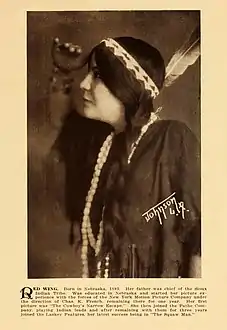Red Wing (actress)
Red Wing (born Lilian Margaret St. Cyr; February 13, 1873 or 1884[1] – March 13, 1974) was an American actress of the silent era. She and her husband James Young Deer have been dubbed by some as one of the first Native American Hollywood "power couple(s)" along with Mona Darkfeather and her actor/director husband Frank E. Montgomery.[2][3][4] St. Cyr was born on the Winnebago Reservation in Nebraska.
Red Wing | |
|---|---|
 Who's Who in the Film World (1914) | |
| Born | Lilian Margaret St. Cyr February 13, 1873 or February 13, 1884 Winnebago Reservation, Nebraska, United States |
| Died | March 13, 1974 (aged 101) or March 13, 1974 (aged 90) |
| Occupation | Actress |
| Years active | 1908 – 1921 |
| Spouses | |
Early life
Lilian attended the Carlisle Indian Industrial School in Pennsylvania, which enrolled students from a variety of Native American tribes, between 1894 and 1902.[5] She moved to Washington, D.C. to work as a domestic servant for Kansas Senator Chester I. Long and his wife. There she met and married James Younger Johnson, nicknamed James Young Deer, on April 9, 1906. Young Deer was of mixed European, African-American and Delaware Indian ancestry (according to St. Cyr) and a member of the Nanticoke tribe. A native of Washington, D.C., Young Deer served in the US Navy during the Spanish–American War.[6]
Personal life and early roles
After they married the couple performed a Western act in various venues around New York City and Philadelphia.[7] In 1908, St. Cyr appeared in the Kalem Company's The White Squaw, followed in May 1909 by Lubin's The Falling Arrow. In the summer of 1909 they worked as technical advisers and extras for The Mended Lute and Indian Runner's Romance both directed by D. W. Griffith.[8] St. Cyr also appeared in the Vitagraph Studios' Red Wing's Gratitude that Fall as the character "Princess Red Wing". Concurrently, they worked for Bison films (New York Motion Picture Company), which relocated from New York City to Edendale in the fall of 1909.[9]
Film
St. Cyr is best known for her feature role in The Squaw Man (1914) by producer/director Cecil B. DeMille and co-director Oscar Apfel, released in 1914. The movie starred Dustin Farnum and Monroe Salisbury. DeMille's first choice had actually been Mona Darkfeather, but she was under contract with the Kalem Company and had to turn down the offer.[10] Her appearance in the film was actually preceded by Jesse Cornplanter's lead in the feature film Hiawatha, released in 1913, a year before The Squaw Man. After that last movie St. Cyr had a role with cowboy star Tom Mix in In the Days of the Thundering Herd (1914) and another one in Fighting Bob (1915). The 1916 version of Ramona, about Native Americans and Spanish colonists in early California, featured St. Cyr in a small role as Ramona's mother.[11]
From 1908 to 1921, St. Cyr performed in more than 35 short Western films.[12] She retired from acting in the 1920s and returned to New York City to settle. She was buried in the Roman Catholic St. Augustine Cemetery in Thurston County, Nebraska, near the Winnebago Reservation.
Popular culture
"Red Wing," a popular song of 1907 by Kerry Mills and Thurland Chattaway, was said to have been performed by her and was associated with her. However, film historians question this.[13]
References
- Aleiss, Angela (24 February 2014). "100 Years Ago: Lillian St. Cyr, First Native Star in Hollywood Feature". Indian Country Today Media Network. Retrieved 8 March 2020.
- "Profile: Lillian St. Cyr (Princess Red Wing) and James Young Deer". nsea.org. Retrieved 11 August 2010.
- Brightwell, Eric (November 20, 2010). "Red Wing and Young Deer, the First Couple of Native American Silent Film". Retrieved February 10, 2014.
- See Billy Doyle’s “Lost Players,” Classic Images, September 1993, 54-55 for Darkfeather's fascinating career, which rose to prominence at the Kalem Company under her husband Frank E. Montgomery.
- "Lilian St. Cyr Student Information Card | Carlisle Indian School Digital Resource Center". carlisleindian.dickinson.edu. Retrieved 2023-02-17.
- Aleiss, Angela (May 2013). "Who Was the Real James Young Deer?". Bright Lights Film Journal. Retrieved January 17, 2014.
- One Reel a Week by Fred J. Balshofer and Arthur C. Miller
- Aleiss, Angela (2022). Hollywood's Native Americans: Stories of Identity and Resistance. Westport, CT/London: Praeger. p. 8.
- Aleiss, Angela (2005). Making the White Man's Indian: Native Americans and Hollywood Movies. Westport, CT/London: Praeger. p. 16.
- The San Francisco Dramatic Review, January 10, 1914, p. 11
- Aleiss, Angela (February 28, 2014). "The Lillian St. Cyr Story, Part 2: 'Squaw Man' and the Hollywood Years". Indian Country Today Media Network. Retrieved March 8, 2014.
- "Young Deer and Red Wing". newspaperrock. Retrieved 11 August 2010.
- O'Connor, Mark (July 15, 2011). "Red Wing". The O'Connor Method - A New American School of String Playing. New American School of String Playing. II. Retrieved July 8, 2013.